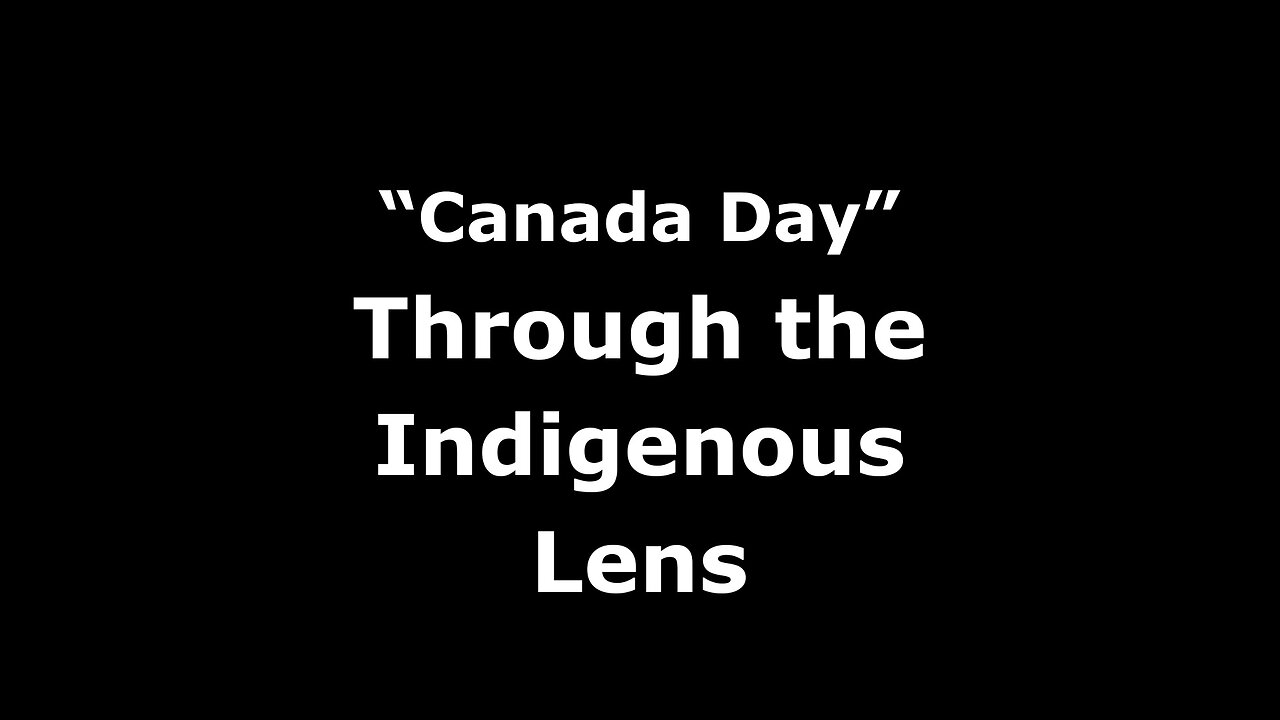Premium Only Content

“Canada Day”, Through the Indigenous Lens
A Day of Mourning, Reflection, and Resurgence. For many Indigenous Peoples across Canada, July 1st is not a day of celebration, but a stark reminder of the country's colonial history and its ongoing impacts.The date often evokes feelings of mourning, reflection, and a call for justice and the recognition of Indigenous sovereignty.
This perspective is rooted in the historical and continued injustices faced by First Nations, Inuit, and Métis communities since Confederation.
The establishment of Canada as a nation on July 1, 1867, marked the beginning of a more formalized and systematic dispossession of Indigenous lands, the suppression of cultures, and the implementation of assimilationist policies. The Indian Act of 1876, a piece of legislation that continues to govern many aspects of Indigenous life, is a significant point of contention.
This act has been used to control and restrict the rights and freedoms of Indigenous Peoples, contributing to a legacy of systemic discrimination and intergenerational trauma.
The painful history of residential schools, the Sixties Scoop, the ongoing crisis of Missing and Murdered Indigenous Women and Girls (MMIWG), and the persistent socio-economic disparities are all deeply intertwined with the narrative of Canada's founding.
For this reason, celebrating "Canada Day" is seen by many as ignoring this painful past and the present-day struggles that are a direct result of it.
In recent years, there has been a growing movement to reframe and reclaim July 1st. The discovery of unmarked graves at the sites of former residential schools has been a significant catalyst, amplifying the calls to cancel or rethink Canada Day celebrations. Hashtags like #CancelCanadaDay and #NotProudToBeCanadian have gained traction on social media, providing a platform for Indigenous voices and their allies to share their perspectives and demand accountability.
The Idle No More movement, which advocates for Indigenous rights and environmental protections, has been a prominent voice in calling for the cancellation of Canada Day celebrations. They encourage a day of action and ceremony to honour the lives lost to the Canadian state and to bring attention to ongoing injustices.
The sentiment of "Every Child Matters" and the significance of Orange Shirt Day (September 30th), which honours the victims and survivors of residential schools, heavily influence the perspective on Canada Day. For many, the celebratory tone of July 1st is deeply discordant with the national tragedy of the residential school system. This has led to the establishment of the National Day for Truth and Reconciliation on September 30th, a statutory holiday to commemorate this dark chapter in Canadian history.
In response to the growing awareness of Indigenous perspectives, many communities and municipalities have begun to alter their July 1st events. Some have cancelled traditional fireworks displays and instead are holding moments of silence, while others are working in collaboration with local Indigenous communities to host events that focus on reflection, education, and reconciliation.
Across Canada, Indigenous communities and their allies organize alternative events on and around July 1st.
These can include:
Sunrise ceremonies and spiritual gatherings: To honour ancestors and the resilience of Indigenous cultures.
*Teach-ins and educational workshops: To inform the public about the true history of Canada from an Indigenous perspective.
Protests and rallies: To demand justice for ongoing issues and to assert Indigenous sovereignty.
Cultural performances and celebrations of Indigenous identity: To showcase the strength and vibrancy of First Nations, Inuit, and Métis cultures.
Community feasts and gatherings: To foster a sense of community and solidarity.
Some communities have chosen to rename the day entirely, such as "Honoring Indigenous Peoples' Day," to shift the focus away from a celebration of the nation-state and towards a recognition of the original inhabitants of the land.
It is important to acknowledge that the Indigenous perspective on Canada Day is not monolithic. While many view it as a day of mourning, others see it as an opportunity for dialogue, education, and a chance to work towards a more inclusive and just future for all who share the land.
Statements from various Indigenous leaders and organizations reflect this spectrum of views. Some leaders have called for a national day of mourning to formally acknowledge the harms of colonization.
Others emphasize the need for non-Indigenous Canadians to use the day to educate themselves on the history of the land they occupy and the treaties that were made. There are also those who see the day as a platform to celebrate the survival and resilience of Indigenous Peoples in the face of adversity.
Ultimately, the Indigenous perspective on Canada Day is a powerful call to confront the complexities of Canada's past and present. It challenges the traditional celebratory narrative and urges a deeper understanding of the nation's history, one that acknowledges the profound and lasting impact of colonialism on Indigenous Peoples. For many, a true celebration of what it means to be on this land can only occur when there is justice, truth, and meaningful reconciliation.
FOLLOW ME HERE ↩️
Twitter / 'X' - https://twitter.com/haa__cham?t=dQ7ueM8Or6RiIPFnTSOUbA&s=09
Instagram - http://www.instagram.com/haa__cham
Threads - https://www.threads.net/@haa__cham
Facebook - https://www.facebook.com/profile.php?id=100094028316135&mibextid=ZbWKwL
TikTok - http://tiktok.com/@haa_cham
Telegram - https://t.me/thatguyhaa
Spotify Playlist - https://open.spotify.com/playlist/3OdVRG7KLfNFMWJBZRTtFT?si=x6h4OmivQWCRIxZgDXtSpQ&utm_source=copy-link
IMDb User Page - https://m.imdb.com/user/ur149990829/?ref_=nv_usr_prof_2
-
 4:42
4:42
Buddy Brown
3 hours agoThe Most GHETTO Chick-fil-A Customer EVER! | Buddy Brown
3477 -
 1:11:14
1:11:14
iCkEdMeL
2 hours ago $1.21 earned🔴 BREAKING: Brian Cole Identified as DC Pipe Bomb Suspect — FBI Arrest
8.42K10 -
 LIVE
LIVE
LFA TV
15 hours agoLIVE & BREAKING NEWS! | THURSDAY 12/04/25
2,934 watching -
 LIVE
LIVE
TheAlecLaceShow
1 hour agoAlec Goes To Capitol Hill for RSC New Media Event | Full Coverage | The Alec Lace Show
42 watching -
 59:25
59:25
VINCE
4 hours agoFINALLY: Jan 6th Pipe Bomber Arrested? | Episode 181 - 12/04/25 VINCE
206K180 -
 1:11:54
1:11:54
Chad Prather
3 hours agoCandace Owens ACCEPTS TPUSA’s Debate Invitation + Dem Rep Instructs Military To REMOVE Trump?!
38K13 -
 1:07:17
1:07:17
Grant Stinchfield
2 hours agoBiden’s Inner Circle Cracks! It's the Presidency That Wasn’t!
3.51K3 -
 1:32:47
1:32:47
Graham Allen
5 hours agoCandace Owens vs TPUSA! It’s Time To End This Before It Destroys Everything Charlie Fought For!
140K561 -
 2:02:57
2:02:57
Badlands Media
12 hours agoBadlands Daily: 12/4/25 – Biden’s Pipe Bomb Narrative, Pentagon Chaos, and the Race to Control the Story
49.2K9 -
 2:14:23
2:14:23
Matt Kohrs
15 hours agoLive Trading Stock Market Open (Futures & Options) || The Matt Kohrs Show
32K